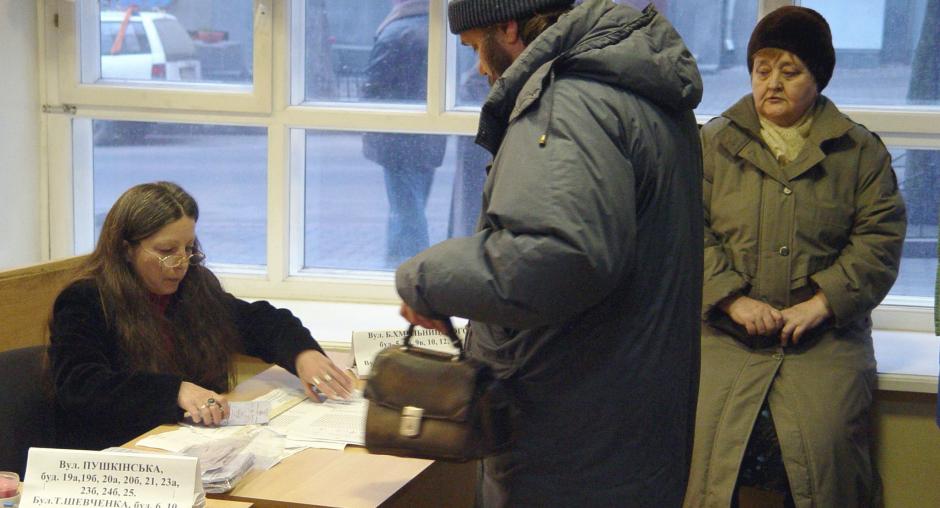Presidential Election, 31 October, 21 November and 26 December 2004

Type:
Country:
Mission at a glance
-
Head of Mission: Amb. Geert-Hinrich Ahrens (Germany)
- 21 core staff in Kyiv
- 55 long-term observers deployed throughout the country
- 900 short-term observers requested
- Core team and long-term observers drawn from 20 OSCE participating States
Mission schedule
-
31 Aug.: mission opens with arrival of the core team
- 12 Sept.: briefing of long-term observers
- 14 Sept.: deployment of long-term observers
- 26 Oct.: arrival of short-term observers
- 31 Oct.: election day
- 1st Nov.: press conference in Kyiv
- 16 Nov.: arrival of short-term observers
- 21 Nov.: repeat voting
- 22 Nov.: press conference in Kyiv
- 22 Dec.: arrival of short-term observers
- 26 Dec.: re-run of second round
- 27 Dec.: press conference in Kyiv
Following an invitation from Ukraine's Foreign Ministry, ODIHR observed the 2004 presidential elections in Ukraine. ODIHR's election observation mission was deployed in late August, and in response to developing circumstances, the deployment of the mission was extended until mid-January 2005.
Headed by Ambassador Geert Hinrich Ahrens of Germany, ODIHR's mission consisted of 57 election experts and long-term observers based in Kyiv and 20 regional centers across Ukraine. Following the annulment of the second-round results, the mission was enlarged to 77 election experts and LTOs.
On 31 October and 21 November, the mission deployed 636 and 563 observers, respectively, from 33 OSCE participating States. On 26 December, 1,372 observers were deployed from 46 OSCE participating States, making the mission the largest ever deployed by ODIHR.
According to the mission's final report: "The 2004 presidential election in Ukraine was a highly competitive contest, which offered voters a genuine choice between a plurality of candidates. While the 31 October (first round) and 21 November (second round) votes failed to meet a considerable number of OSCE Commitments, Council of Europe and other international standards for democratic elections, the 26 December repeat second round vote brought Ukraine substantially closer to meeting them. The improvement was most clearly demonstrated in the media coverage, the overall conduct of the campaign and the transparency in the CEC performance, including the immediate publication of polling station results. These measures stand in stark contrast to the previous votes, and demonstrate that when a clear political will is evident to conduct an election in line with OSCE commitments, much can ultimately be achieved in a short time period."
For the three election days - 31 October, 21 November and 26 December - the mission joined efforts with delegations from the OSCE Parliamentary Assembly, the Parliamentary Assembly of the Council of Europe, the European Parliament, and the NATO Parliamentary Assembly.
Short-term observation
First round of voting
Shortly before the 31 October polling, ODIHR deployed more than 600 short-term observers from 34 OSCE participating States across Ukraine in teams of two to monitor the opening of polling stations, the voting, the counting of ballots, and the tabulation of results at all levels.
On 1 November, the mission issued a statement of preliminary findings and conclusions on the 31 October poll.
On 10 November, the Central Election Commission (CEC) adopted a resolution announcing the results of the first round. As no candidate obtained an absolute majority, the CEC decided to hold a second round of voting on 21 November. The candidates in the second round were Viktor Yushchenko and Viktor Yanukovych, who obtained 39.87 per cent and 39.32 per cent of the votes, respectively.
Second round of voting
Shortly before the 21 November polling day, ODIHR deployed 600 short-term observers to monitor the opening of polling stations, the voting, the counting of ballots, and the tabulation of results at all levels of the election administration.
On 22 November, the mission held a press conference in Kyiv and issued a statement of preliminary findings and conclusions on the second round of the election.
On 3 December, the Supreme Court invalidated a resolution of the CEC of 24 November announcing that Mr. Yanukovych had won the election. The Supreme Court ordered the CEC to adopt a resolution calling for a re-run of the second round on 26 December.
Previous elections
ODIHR has observed a number of elections in Ukraine, including the 1999 presidential election and the 2002 parliamentary elections.
